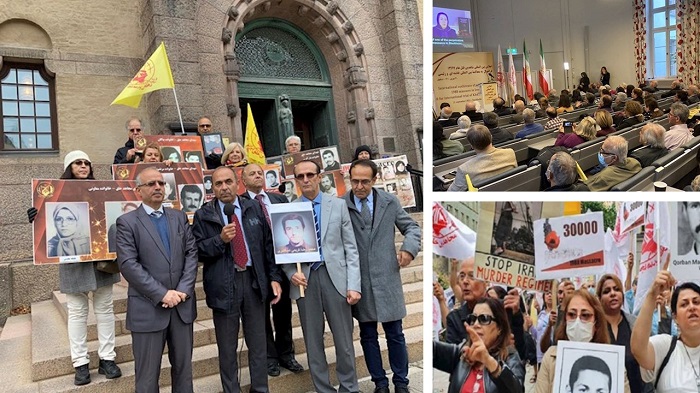
The People’s Mojahedin Organization of Iran (PMOI/MEK) reported on September 21 that an international conference had taken place in Stockholm, Sweden to discuss the need for the Iranian regime officials involved in the mass execution of political prisoners to be finally held accountable for their crimes against humanity.
The MEK said, “The event focused on the extrajudicial and summary execution of more than 30,000 Iranian political prisoners in the summer of 1988, an even that has become known as the ‘1988 massacre’.”
Many senior officials within the regime, including the new president Ebrahim Raisi, played key roles in the atrocities of that fateful summer and have lived the past 33 years under a blanket of impunity, avoiding any accountability for their actions. Raisi was on the panel of judges in the ‘Death Commission’ in Tehran, who processed political prisoners in minute long trials before sending them to their deaths if they refused to denounce their support of the MEK.
Present at the conference were many former political prisoners who served time in some of Iran’s most notorious prisons, witnesses of the 1988 massacre, as well as a number of prominent politicians from across the world.
President-elect of the National Council of Resistance of Iran (NCRI), Maryam Rajavi gave a keynote speech at the event. She said of the 30,000 political prisoners who were hanged in the summer of 1988, at least 90% of them were members or supporters of the MEK.
Maryam Rajavi said, “Khomeini sought to eradicate the PMOI quickly. He wanted to carry out the horrendous massacre in total silence. The plan for the killings in Tehran and dozens of other cities was designed such that no one would know about it.”
Since 1988, the NCRI and the MEK, as well as many other groups affiliated with the Iranian Resistance in Iran have taken widespread efforts to document as much information as possible about the 1988 massacre, while revealing the secrets about the atrocities that the regime have tried to cover up.
The MEK said, “These efforts have shed light on one of the horrendous crimes against humanity in contemporary history and have brought international attention to the brutalities committed by the Iranian regime.”
At a virtual conference hosted by the NCRI last month, international law experts noted that the 1988 massacre constitutes as genocide and called for regime officials to be prosecuted accordingly in international courts. The lack of accountability in the past 33 years have emboldened the regime to continue their trend of human rights abuses, including the murder of over 1,500 protesters in the November 2019 uprisings.
The MEK said, “Rajavi called on the world to condemn the clerical regime’s brutal and systematic violation of human rights in Iran and stressed that the continuation and expansion of political and economic ties with this regime must be predicated on the improvement of the human rights situation and an end to executions and torture in Iran.”
The conference on September 21 also featured a speech from Nasrollah Marandi, who was a former political prisoner and a witness of the 1988 massacre.
Marandi described how Revolutionary Guards used wheelbarrows to transport the ropes to the execution halls to be used to hang prisoners, and then used the same wheelbarrows to take the footwear of the executed prisoners away. Marandi also recalled seeing the trucks used to remove the bodies of those executed away from the prison.